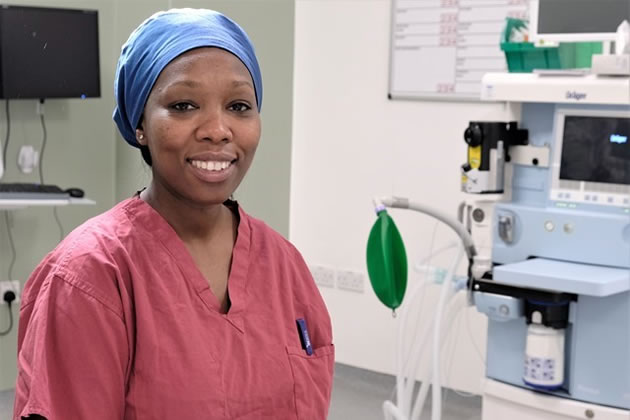The Refugee Who Became a Surgeon in Ealing
Sala Abdalla arrived from Sudan when she was ten years old

Sala Abdalla is now a consultant at Ealing Hospital
A newly appointed consultant at Ealing Hospital has told what it was inspired her to become a surgeon.
Sala Abdalla came to this country as a refugee with her family when she was just ten years old. She was determined to follow a career in medicine after being moved by the injustices of private healthcare in her homeland.
Now she is on of only a handful of black female consultants working for the trust.
“We left the Sudan when I was ten years old but it made a real impression on me that if you didn’t have money you were often destined to die prematurely of otherwise treatable conditions. Anything is possible if you have the right work-ethic,” says the 37-year-old consultant who could only speak Arabic when she arrived in the capital.
Sala added, “I sought solace in education and my teachers at Robert Clack School were extremely supportive. They never doubted that I would make it and I owe them a lot of gratitude.”
She is one of a growing number of women entering a traditionally male-dominated profession but the number is growing every year.
She added, “It takes a lot of commitment, hard-work and sacrifice to be a surgeon but it is an incredibly rewarding profession.
“I love what I do and there is no match for the satisfaction I get from knowing I have used my knowledge and technical skills to make a difference to another person’s life”
Her willingness to help others less fortunate led her to set-up a surgical charity called Operation International where groups of surgeons, nurses and anaesthetists volunteer to travel to low-income countries to carry out free operations and train local doctors and nurses.
She has made two trips to hospitals in rural Ghana working with fellow volunteers who performed 143 procedures in less than a week.
“It brings its own challenges and you just have to adapt. Power cuts were common and I sometimes had to operate with a torch strapped to my head. The staff in Ghana were exceptionally innovative and hard-working. It was a pleasure to serve the local community.”
Sala’s career in the UK is no less dramatic and, as a general and upper GI surgeon, she carries out a wide range of procedures.
“My specialty is fast-paced and dynamic and the breadth of disease-processes that it covers makes for interesting and satisfying work. I perform operations which are life-saving, such as removing a ruptured appendix or dead bowel.
“I also perform function-restoring surgery, treating patients with debilitating hernias or gallstone problems that interfere with their daily activities.
“I like the immediacy of the results. A patient can come in with a life-threatening condition and, if the procedure is successful, be sitting up in bed the next day.”
“My advice to any young woman interested in a surgical career is to never think it is beyond them. Surgery is one of the most demanding of medical disciplines, requiring years of dedication, discipline and resilience.
“However, it teaches you to become confident, decisive and an excellent problem solver. It is a rewarding career with opportunities to develop additional interests such as in research, teaching and mentoring.
“I would highly recommend a career in general surgery to any young person who is interested in a career that demands a lot but gives you even more in return.”
Like Reading Articles Like This? Help Us Produce More This site remains committed to providing local community news and public interest journalism. Articles such as the one above are integral to what we do. We aim to feature as much as possible on local societies, charities based in the area, fundraising efforts by residents, community-based initiatives and even helping people find missing pets. We’ve always done that and won’t be changing, in fact we’d like to do more. However, the readership that these stories generates is often below that needed to cover the cost of producing them. Our financial resources are limited and the local media environment is intensely competitive so there is a constraint on what we can do. We are therefore asking our readers to consider offering financial support to these efforts. Any money given will help support community and public interest news and the expansion of our coverage in this area. A suggested monthly payment is £8 but we would be grateful for any amount for instance if you think this site offers the equivalent value of a subscription to a daily printed newspaper you may wish to consider £20 per month. If neither of these amounts is suitable for you then contact info@neighbournet.com and we can set up an alternative. All payments are made through a secure web site. One-off donations are also appreciated. Choose The Amount You Wish To Contribute. If you do support us in this way we’d be interested to hear what kind of articles you would like to see more of on the site – send your suggestions to the editor. For businesses we offer the chance to be a corporate sponsor of community content on the site. For £30 plus VAT per month you will be the designated sponsor of at least one article a month with your logo appearing if supplied. If there is a specific community group or initiative you’d like to support we can make sure your sponsorship is featured on related content for a one off payment of £50 plus VAT. All payments are made through a secure web site. |
December 16, 2021